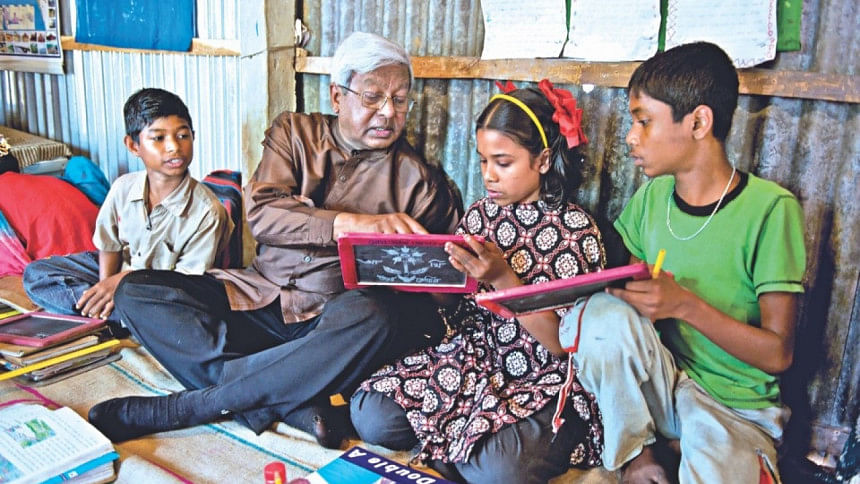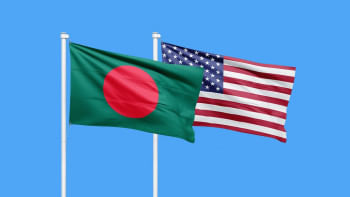Thank You, Abed Bhai

It was in March 1979 when I met Sir Fazle Hasan Abed for the first time. He called me for a job interview. I met him at his modest office of the then Bangladesh Rural Advancement Committee (BRAC) on Circular Road, Moghbazar.
He wanted to create an organisation that would work toward the alleviation of economic and social poverty in Bangladesh, and the organisation would need highly-educated professionals. He wanted the best to work for the poor people, and he mentioned that I would be his first hire with a Ph.D., and toward the end of the interview, he said he would welcome me to join BRAC as an Executive Assistant. I joined on April 4, 1979. From 1979 onwards, I worked with this visionary individual for thirty years. As they say, the rest is history.
I found Abed Bhai a most innovative, confident, inspiring and down-to-earth person; a wise leader, a very capable manager, and interestingly, an accountant with a solid vision for the greater good. His vision was to establish a society which was free of exploitation, with the extensive involvement of those exploited—the disadvantaged women of Bangladesh. He had tremendous faith in the strength of women, especially those who lived in poverty. He did not believe in the general sentiment that the poor are weak by default. In his mind, people were not born poor, but that social dynamics, which favoured the rich and powerful, kept those people poor. He strongly believed that, given the opportunity, the poor would be able to free themselves from economic and social poverty. He believed in the potential of people, regardless of social class, and that a development worker could learn a lot from working directly with those economically disadvantaged.
As part of his vision of building a professional development organisation, Abed Bhai recruited university graduates in 1972 and sent them to villages in Sulla, Sylhet to alleviate the sufferings of the returning refugees after Bangladesh's Liberation. Subsequently, some of those graduates, after living and working with the poor people, learned enormously, provided leadership to the organisation, and helped it grow.
Abed Bhai always thought about the organisation first, before he thought about himself. He didn't want publicity. He used to say, "Work hard, do something worthwhile, your work will bring you recognition." Standing by these principles, he ensured that BRAC did not promote self-aggrandisement, and did not directly promote itself in those days. Recognition and accolades followed its good work.
During my years working with Abed Bhai, I noticed his penchant for innovation first-hand. When I joined BRAC, he said, you have received higher education but you do not know the realities of the people of Bangladesh, especially the rural people. He said we would go to the villages, see how people really lived. I went with him to Sulla, an experience which exposed me to the struggle of the poor villagers, and I learned about the work of BRAC by meeting with the BRAC field staff. It was an eye-opening experience. At meetings with the locals and the staff, Abed Bhai was always an intense and active listener. I could see that his future decisions were made based on what he heard in the field.
Abed Bhai once read a Newsweek article mentioning countries that were best in educating children and youth. The article said that Japan was best in teaching children mathematics; the USA in undergraduate teaching; Great Britain in graduate teaching; China in memorising; and finally New Zealand in developing reading skills. At that time, BRAC's Non-Formal Primary Education (NFPE) programme was going through several innovative interventions. As the leader of that organisation, I was asked by Abed Bhai to go to the closest embassy of New Zealand (then in New Delhi), and see if we could get some teachers/experts to help BRAC improve the reading skills of the BRAC school children. We were able to get two New Zealanders who worked with the children's education programme of BRAC, and helped them introduce innovative language learning methodologies. This is only one example of how Abed Bhai used practical lessons that he learned from other places in the world, and used them to enhance his organisation, never fearing that anything was impossible.
I also remember another innovation in the method of maintaining the cold chain of poultry vaccines in the villages. Fridges were only available at the Upazila levels. It was a challenge to take those vaccines to the villages. Abed Bhai told us to go and learn from the villagers. We found out that the villagers took those vaccines inside ripe bananas. So we adopted the local method and used it to transport the vaccines on the vaccination day, and the potency of the vaccines remained.
One learning experience with Abed Bhai was that he always looked for opportunities to build the future managers and leaders in the organisation. He sought funds to send young staff members for training in management and technical skills, both within and outside the country. A large number of BRAC staff were sent abroad for professional degree and non-degree programmes in management and technical skills, who then came back and served the people. His theory of "the best working for the poorest" was implemented.
Abed Bhai never believed that one could solve the enormous problems of Bangladesh society with small efforts here and there. It needed large efforts. He believed in the saying that "small is beautiful, but big is necessary". He saw the big picture, found small and local ways to pilot ideas and innovate, and then scale what the organisation learned throughout the country. The first programme which was scaled up nationally was the Oral Rehydration Education programme. It started as a pilot in Sulla in 1979, and was scaled up to the nation over a period of ten years. It gave BRAC management the confidence to manage national programmes and the courage to undertake other programmes.
BRAC's education programme is a case in point. It was started in the early 1980s with 22 schools and, over the next ten years, scaled up to 50,000 pre-primary and primary schools. The expansion of the microfinance programme was another endeavour. It started small with a few hundred people and then increased to over 7 million female borrowers all over the country. Abed Bhai was extremely confident that BRAC's managers and staff could accomplish his big, audacious goals. He ensured that there was timely training and capacity-building of the staff members. He had a winning formula: through training and experience, the organisation would have the right skills, and each new office area would be assigned a senior leader, along with new staff members to set up operations. It worked incredibly well, despite some initial hesitation from the staff and managers. He inspired, motivated, trained and believed in us to move forward, and we did.
BRAC Bank and BRAC University were off-shoot ideas that Abed Bhai thoughtfully generated and executed. He understood that there would be a need for a bank for those who graduated from microfinance programmes. He saw universities as long-sustaining institutions, and recognised the need that Bangladesh would have for qualified leaders and managers for the future development of the country. The BRAC University was born to facilitate that.
There were numerous other examples of Abed Bhai's innovative approaches. As an accountant, he understood numbers; as a manager, he understood the value of developing others. As a leader, he envisioned big ideas, and inspired those around him to execute these. If we were thinking in 3-year terms, he would think in 25-year terms. Thus, BRAC grew from a 300-employee organisation, when I joined in 1979, to a 200,000+ organisation in 2019. In 1972, at the inception of BRAC, it was a very small, one-dimensional organisation, implementing relief and rehabilitation programmes. Under Abed Bhai's leadership, it became a multifaceted development and social business institution with major development programmes including microfinance, children's primary and non-primary education, primary healthcare, training and human rights. These programmes, built in national scope over a period of 15-20 years, focused on the bottom fifty percent of the population of Bangladesh, and put BRAC on the world map as a highly successful non-profit organisation.
Abed Bhai not only thought at a national level for Bangladesh, but also about how to scale BRAC internationally. BRAC now has a presence in African countries, Myanmar, Pakistan, Afghanistan and the Philippines. He put tremendous emphasis on education for developing countries. He believed that empowerment of the general populace, especially the poor, could be achieved through awareness and income. From this foundational belief, and always acting on behalf of the poor, he created social businesses backed by BRAC, including poultry and fish hatcheries, dairy and poultry programmes, Aarong, BRAC Bank, BRAC University and others. These endeavours connected the rural poor women and men to a market that their small businesses would otherwise never have found access to (particularly through the creation of Aarong and BRAC Dairy). That marketplace alone is an outstanding innovation that stemmed from Abed Bhai's brilliance and careful attention to the problems facing the rural poor.
Abed Bhai was a far-sighted visionary, and founded a world-renowned development organisation that is currently 75 percent self-financed, and has touched more than 110 million lives to date. The present leadership team of BRAC has a big challenge at hand to sustain the dynamic activities in the years to come. His are enormous shoes to fill. The world will remain indebted to Sir Fazle Hasan Abed.
Thank you, Abed Bhai. You will always be with us.
Dr Salehuddin Ahmed is the former Deputy Executive Director of BRAC, former Pro-Vice Chancellor of BRAC University, and former Managing Director of The Daily Star. He is currently an adjunct professor at BRACU, IUB and UIU. Email: [email protected]

 For all latest news, follow The Daily Star's Google News channel.
For all latest news, follow The Daily Star's Google News channel. 



Comments